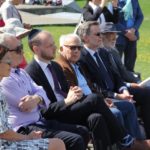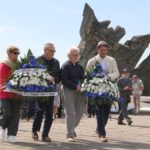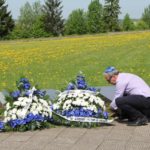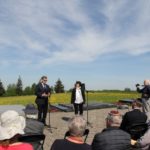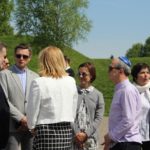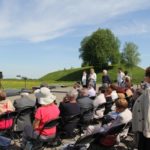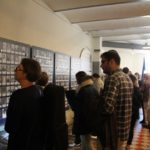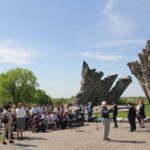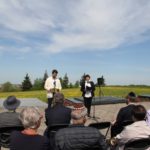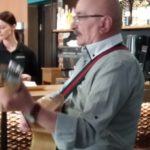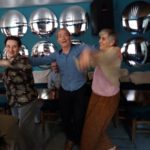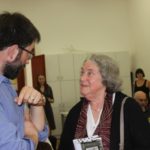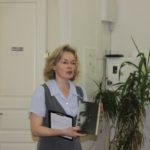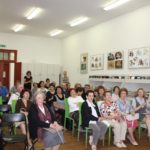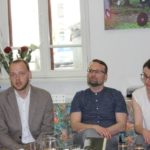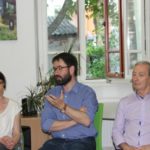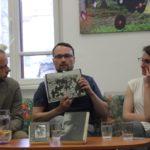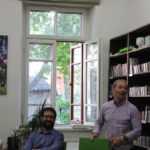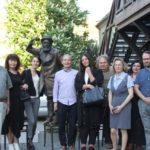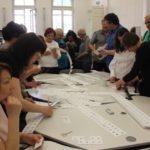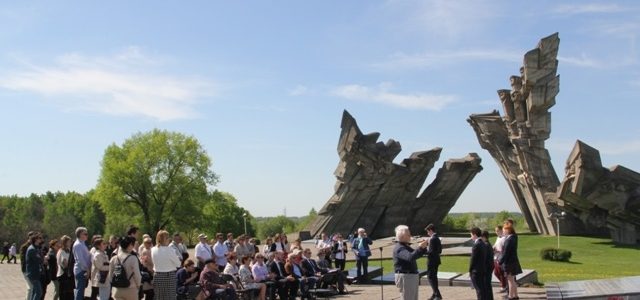
The second week in May saw numerous events and meetings at the Kaunas Jewish Community.
The hectic and hot week began with a meeting between representatives of the Kaunas Jewish Community and the Denkendorfer Kries für christlich-jüdische Begegnung (Denkendorf Association for Chirstian-Jewish Encounter) from Germany. Association board members Eva and Otmar Vöhringer have been inviting their compatriots for several years now to undertake what are in a sense pilgrimages to Holocaust sites in Poland and the Baltic states and to meet survivors and descendants of survivors in those countries. More than 20 years ago now Dr. Hartmut Metzger began and became the spiritual inspiration behind this initiative. He also worked with late Kaunas Jewish Community member Judelis Ronderis to organize aid for impoverished Jews who had been evacuated to the Soviet Union during the Holocaust.
On May 8 the members of the association of family and friends of deportee convoy no. 73 visited Kaunas and the Ninth Fort in Kaunas. The group comes to Kaunas from France once every two years and warm and friendly friendships have been made with the Kaunas Jewish Community. LJC executive director Renaldas Vaisbrodas attended the ceremony at the Ninth Fort this year. On May 15, 1944, convoy no. 73, a train from Drancy, France, delivered 878 Jews to the Baltic states, most of whom were taken off the train in Kaunas and shot at the Ninth Fort. Others were taken to the camp in Pravieniškiai, Lithuania, and to Estonia.
On May 10 there was a presentation of the Lithuanian translation of Yitzhak Rudashevski’s Vilnius ghetto diary at the Vincas Kudirka Public Library on Mapu street in Kaunas. Translator Dr. Mindaugas Kvietkauskas and book designer Sigutė Clebinskaitė spoke, as did LJC executive director Renaldas Vaisbrodas. The event was moderated by Dr. Linas Venclauskas. The guests spoke emotionally of the process of making the book, about Rudashevski’s life and fate, and shared plans for the future. Their words were not only interesting but moving and emotional, as if they had lived through it themselves in bringing the book to Lithuanian readers, and as if they are still feeling the same strong emotion created by the diary and the story of its discovery. After the book presentation there was a brief introduction to the Yiddish language and alphabet, and attendees were invited to write their names in Yiddish characters.
On May 11 the Kaunas Jewish Community celebrated the end of World War II and the victory against the Nazis. KJC members whose loved ones, husbands and parents fought in World War II were invited to a holiday brunch. Sadly only one WWII veteran and KJC member is still alive, Liubov Yablonovich, but she was unable to attend because of health. Participants shared stories of the war they’d heard from their relatives who fought, and the musicians Michail Javič and Aleksandras Rave performed martial airs from the period and post-war drinking songs and ballads.


